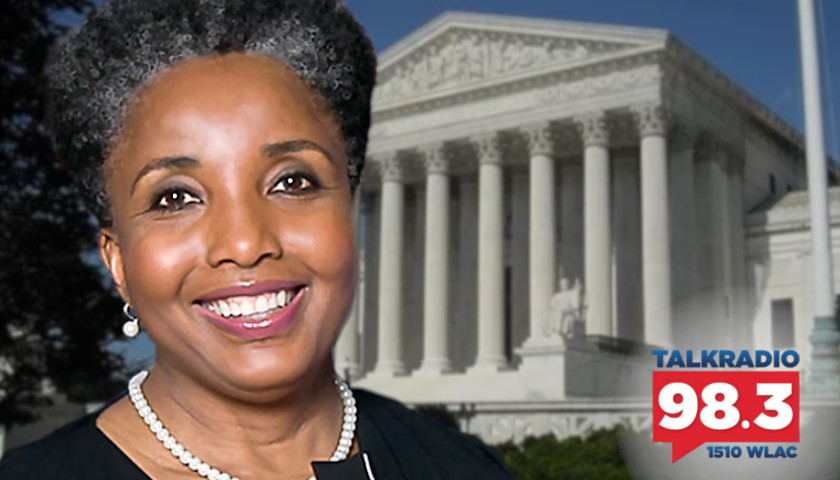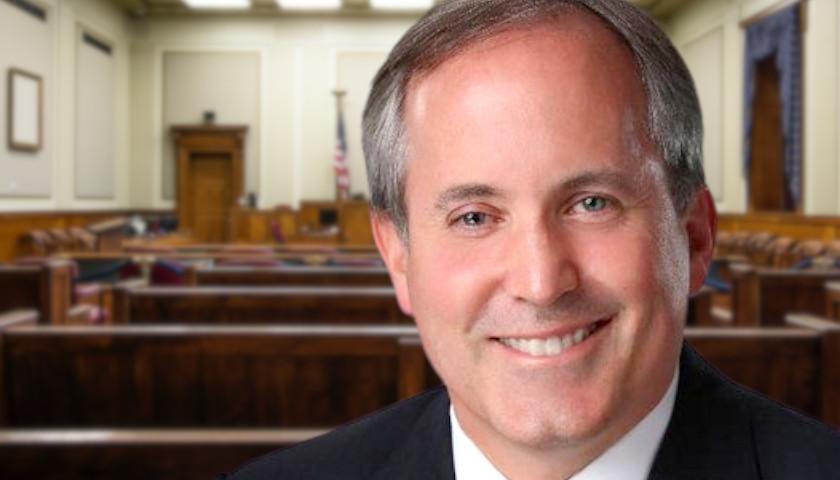Live from Music Row Thursday morning on The Tennessee Star Report with Michael Patrick Leahy – broadcast on Nashville’s Talk Radio 98.3 and 1510 WLAC weekdays from 5:00 a.m. to 8:00 a.m. – host Leahy welcomed all-star panelist, Dr. Carol Swain, to the studio to discuss Tennessee joining the Texas lawsuit and take a call from an brilliant listener named Kyle.
Leahy: It’s Thursday, December 10 and the Electoral College is supposed to meet on Monday in the 50 state capitals. And we are joined in studio by our very good friend all-star panelist, former Vanderbilt Professor, former Princeton Professor, former Mayoral candidate, and an all-around outstanding American, Carol Swain. Good morning, Carol.
Swain: Good morning. You left out Dr. Carol Swain. That’s ok. (Laughs)
Leahy: Dr. Carol Swain.
Swain: But that’s okay. I’m not into titles. (Laughs)
Leahy: You know, I hear this all the time Carol. Our listeners are very very interested in hearing about you and hearing about what you’re doing and hearing about you know, what you think matters. There’s a connection that our listeners have with you. So I salute you for being able to reach all of our listeners in that way.
Swain: I think they know that I care about them and I care about America. and everything I do, you know, it’s really not about me. And even you know, I would say this about you and all of us in the public eye. We may think our lives about us, but our lives are bigger than us. And everything we do if you’re in the public eye, it impacts a lot of people. So you can do good or you can do evil.
Leahy: Well and you and I, we try to do good. That’s our intention.
Swain: We do and we’re often on the losing side.
Leahy: We are.
Swain: But in the big scheme of things in the whole universe for all eternity we are on the winning side.
Leahy: You know speaking of fighting the good fight. I am just stunned at how outstanding this lawsuit filed by Texas in the Supreme Court is in suing the states of Georgia, Michigan, Pennsylvania, and Wisconsin because there’s widespread evidence of dramatic cheating in those states in the presidential election. That lawsuit by the way has now been joined by 17 other States, including Tennessee.
Swain: I’m very proud of Governor Lee and Slatery for making that decision because they’re not always made the right decisions for Tennessee. But this time they did.
Leahy: Not only that Carol they made them and it’s a timely decision. And so I have been critical of the governor and of Attorney General Slatery at times. But I must say this is an outstanding decision that they’ve made.
Swain: Well, I mean, they listened to the voters of Tennessee because a lot of us did call. We expressed our opinions. Americans are beginning to wonder if their opinions matter. But they did in Tennessee this week.
Leahy: The Supreme Court if they are thinking of the separation of powers and the Constitution as they’re considering whether or not to take this case there is an argument that could be made not to take the case because Texas and these other 17 states theoretically don’t have standing. I don’t think that’s a strong argument. But nonetheless.
Swain: What do you mean they don’t have standing? I thought the fact that the states suing States and the original jurisdiction would automatically give them standing?
Leahy: Well, here’s the thing. The precedent is that the court does not have to take up these cases between states.
Swain: Because it’s a political controversy?
Leahy: No. The precedent to have discretion. I want to read from an article that has been written by Margot Cleveland who is a former law clerk for a federal appellate judge at The Federalist. Here’s what she says about standing.
Swain: All right.
Leahy: It’s right on point. Texas has standing to sue. Merely alleging the defendant states violated the Constitution however is not enough. Texas must also establish that it has standing to sue meaning it has been injured in a way entitling it to stand and to seek redress. In its motion to leave is the motion for leave. Texas argues at great length that it has two endings and presents three separate basis for it.
First, Texas claims the right to present the constitutional claims of its citizens who have the right to demand that all states abide by the constitutionally set of rules in appointing presidential electors. Second, Texas presses its own form of voting rights injury as states premise on the structure of the Constitution. Whereas a House represents the people proportionally and the Senate represents the states.
Thus while Americans likely care more about who is elected president, the states have a distinct interest in who is elected vice-president and thus who can cast the tie-breaking vote in the Senate Texas argues. Finally, Texas argues that it has standing to sue as a representative of the state’s electors. These electors, Texas argues, suffer a legislative injury whenever allegedly improper actions deny them a working majority. Those are strong arguments for standing.
Swain: I would say that they are. And I think the case was brilliant. And it’s like a law professor’s dream because it’s laid out in such a way that it could be a historical case. And Ted Cruz, you know, we know him and Senator Cruz, and I’ve been critical of him at times. I’ve supported him at times but this may be his moment. And if he argued before the Supreme Court, and this case is decided on behalf of the American people because we should have some kind of standing. I think that it will be a game-changer for him. And I would love to see him on the Supreme Court.
Leahy: Well, that’s interesting. We’ll get to Ted Cruz in a minute. We want to go to a caller though. Kyle wants to talk about the Supreme Court and original jurisdiction. Good morning Kyle you’re on The Tennessee Star Report with Michael Patrick Leahy and Carol Swain.
Caller Kyle: Hey good morning y’all. How y’all doing?
Swain: Good morning.
Kyle: So I wanted to make a point about original jurisdiction and also add to it a little bit of the standing that you were just talking about.
Leahy: By the way Kyle let me ask, are you an attorney?
Swain: No he stayed at a Holiday Inn Express once.
Leahy: You are not an attorney. Have you stayed at a Holiday Inn Express?
Kyle: I have. (Laughter)
Swain: So he can speak. (Chuckles)
Leahy: OK. Go ahead. (Laughs)
Kyle: So the first on standing is we as a union all join in a contract with our elections. And that contract is to follow the Constitution in those elections. If one state breaks that contract then of course the other states in that contract would have standing.
Leahy: They’ve been injured.
Kyle: Yes.
Leahy: This is the core of the issue isn’t it? Seventy four million Trump voters believe that four or five states have cheated.
Swain: And I don’t believe it’s just Trump voters. I think the American people do too.
Kyle: I agree. And then my second and more importantly is the point about our original jurisdiction. So usually a case will be brought to the Supreme Court on appeal. And so the lower courts would have a record of the evidentiary hearing. In this case, since it’s an original jurisdiction case the Supreme Court actually is allowed to admit the evidence.
So all the evidence that we have been seeing of videos, affidavits, and all of that is admissible in this case for in the Supreme Court if they take the case up. This is a very important point because I would imagine that just the evidence that was shown in the state hearing wasn’t the Trump team’s best evidence.
You wouldn’t show your best evidence until you got into a court and had an evidentiary hearing. So I wouldn’t be surprised if the Supreme Court took this case up. We’ve seen damning evidence of fraud or you know statutes being broken in the Supreme Court. And that’s my only point. I’ll hang up the phone.
Leahy: Kyle, hang on. I have a question for you. When you stayed at that Holiday Inn Express, there must have been a law school class going on at the time.
Swain: No. He’s a political scientist or something like that.
Kyle: No I’m a civil engineer.
Swain: He’s just brilliant. He’s smarter than all of us.
Leahy: How do you know this? You make a compelling argument that you would expect a constitutional lawyer to make before the Supreme Court. How did you do that?
Kyle: Well, I have a deep passion for the way our country was founded. I have a deep passion for justice and reasoned argument. And so I don’t listen to the news. I look directly at the Supreme Court website and I follow lawyers who have presented arguments to the Supreme Court. And I look at their advice and then I also compare that to you know, the everyday work I do with the government. How local ordinances in Metro Nashville or Wilson County or wherever I’m working, how those are interpreted. And then I try to apply that to the functionality of the Supreme Court or law in general.
Swain: Kyle how old are you?
Kyle: I am 31.
Swain: Well, I mean, I’m sure you’re great at your job, but you do have a brilliant mind.
Leahy: You need to go to law school and become a constitutional lawyer part-time.
Swain: And teach students because they need help.
Leahy: Kyle thank you. This shows you how smart our listeners are.
Swain: They certainly are.
Leahy: That was a great argument. Hats off to Kyle for that argument.
Listen to the full second hour here:
– – –
Tune in weekdays from 5:00 – 8:00 a.m. to the Tennessee Star Report with Michael Patrick Leahy on Talk Radio 98.3 FM WLAC 1510. Listen online at iHeart Radio.





